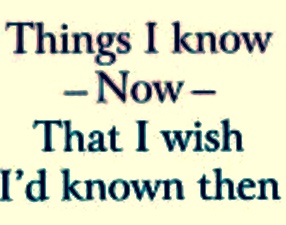What Every Weight Loss Surgery Candidate Should Know

The first group were people going through the process of being approved for surgery. The second group had received surgery recently and were in the first few months of reducing. The third group were people who had surgery about a year ago and had lost a substantial amount of weight. And then there was me. I was the only one there who'd had WLS more than a year ago (2003 is certainly more than a year ago!).
As I listened to the discussion, what struck me was that the main voices in the room were those in the honeymoon period. Most speakers were less than a year out from their surgery, had lost a tremendous amount of weight and were very euphoric.
The theme that dominated the session was that it is smart for the prospective patient and those in the first few months post-surgery to surround themselves with people who have only positive things to say about their WLS, only read positive message boards and blogs, and keep away from any 'negative' perspectives.
I make a point of spending time on message boards where people are struggling with their weight-loss surgery. I need to be able to understand their challenges in addition to those I have personally faced. As a Life Coach I need to see why and how people struggle and how they get beyond it. In addition to benefiting me professionally, this helps me on my own journey to maintain my goal weight when my old thoughts and behavior patterns re-appear.
I spoke up to the group last night because I think it's important for all of us to focus not only on the positive, but also to acknowledge the land-mines that anyone can experience after weight-loss surgery. Otherwise, the opportunity is lost to learn from the struggles of others and avoid avoidable pit-falls.
Weight loss surgery is an amazing tool for change, but it isn't good for everyone. Attention to some peoples' bad post-surgical experiences is an opportunity to balance the information given (or not given) by the those with an economic incentive to sell surgery. For example, at last night's meeting there was a woman (who has been approved for surgery in November) talking about how she looked forward to the end surgery would bring to her desire to eat in stressful situations. The professionals in the room were silent.
I said to this woman, "Many weight-loss surgery patients still battle the tendency to eat when stressed." I told her that she shouldn't expect the surgery to eliminate the desire to eat when stressed and that it would be wise to begin to create strategies now for dealing with her stress after surgery.
I told her that in my experience and in the experience of many of my clients, the stressful situations that triggered the desire to eat in the past are still very present after weight-loss surgery. With the loss of food as an ally and a slimming body that can feel vulnerable and unprotected in the world many turn to drugs or alcohol or force unhealthy foods down their throats looking for a de-stressor or comfort.
Last night's discussion leads me to ask you, the BariatricPal veteran, the following questions:
What were you told prior to surgery about life after surgery that was not entirely true or was not the entire story?
What do you wish you had fully understood prior to surgery that you did not and what do you believe would have put you in the best possible position to succeed after surgery?
What information, if any, was missing in the lead-up to your surgery that gave you unreasonable expectations or that led to disappointment in the months or years since surgery?
I don't pose these questions to be negative, I want as many people as possible to succeed with their surgeries! I want to clear the air and "add to the record" about what weight-loss surgery does and what it will NEVER do.
So, those of you who have had surgery, what do you want those considering surgery to know?
I was on the boards for over a year pre-op, and inhaled all kinds of stories. I was (I believe) adequately prepared for how the VSG would be a tool, would offer a brief time (1 year) to build new skills, deal with surprising upsets about not being able to soothe myself with food. I also realized I needed to be in therapy, during my journey -- I call it my Year of Losing Weight, my Year of Maintaining my Weight, and Boring Real Life. That's my therapy commitment -- three years.
I'm old enough to know that life isn't an endless honeymoon. Boredom, habits and real life end all honeymoons. And then the marriage begins.
So I was well prepared.
I do see those who are starstruck and want to wake up 365 days later and find themselves Cinderella at the Ball being chased around the floor by The Prince. I see some who are, frankly, not smart enough to appreciate what they're doing to themselves and what it will mean. I seem some who thought they were ready, but find it so much harder to adapt than they'd dreamed. Some of those adapt. Some of them don't. I see some who can't be compliant because they're too food-addicted or simply unable to follow directions or those who can't let anyone be the boss of them or those who think they're too special to do it the boring way everyone else does.
I see the perfection puppies, the alcoholics, the ones whose lives are a train wreck with no space in it for self-protection, the wounded adult children, the smart ones who can fix everything but their weight. I see those with bad surgeons and inattentive care. I see those with no support at home or outright antagonism and hate disguised as nagging. People who are desperate enough to have weight loss surgery are not all in mental spaces or physical spaces that are safe enough for them to undergo WLS and its aftermath.
Of course, I see people who do well. A lot of them are older. They know it won't be perfect, but they're patient. They have seen tough times, and they aren't shocked by some tough things about WLS. They're a bit long-suffering and don't bitch about every new food that doesn't thrill their palate. They can tolerate temporary discomfort to get to the easier times two months out. In a word, they're just compliant -- or as compliant as they can be. They don't beat themselves up when they're not perfect and they are resilient enough to get back on the path without being a drama llama about it.
They don't start threads with titles like: "Oy vey ist mir!" or "Will I ever be happy again?" or "Please tell me this won't last forever." They already know they'll be happy again, that this won't last forever, and that ein bischen vey doesn't require a clickbait thread title.
What I wish I would have known prior to surgery, but did not believe was......that I would have such body dismorphic images as I lost the weight. I did not realize how hard it would be to see myself as a normal weight being. By not being prepared for that, it makes it hard for me to SEE the progress I am truly making. I do get a glimpse into reality about my body when comparing PICTURES, but still struggle seeing it in the mirror. I think I also had unreasonable expectations about what is considered "good/healthy" weight loss on a monthly basis. I thought the weight would drop off more quickly, and that one to two pounds a week (four to eight pounds a month) seemed way too slow....... It really wasn't until after I had the surgery, when going to monthly doctor's appoinments that I came to lower my PERSONAL EXPECTATIONS and find a more REALISTIC EXPECTATION.
Edited by HealthyNewMe@@Sara Kelly Keenan LC Thank you for this topic. At my support group everyone was all champagne and roses and I know life isnt like that. I am a planner by nature so I like to think thing through and plan for the good and the bad. I am scared and overwhelmed at the possible path of my new life. I want to hear all kinds of stories...both good and bad so I can know what I am getting into. I know I will struggle greatly at loosing my best friend (food) so the more I can work through it now the better. My final appointment to submit to insurance is about 2 weeks away. Thanks
This is a great reply post. Very very true. I was lurking around here for at least one year before surgery and I've taken stock of the same things you've observed about the difference in people.
I was on the boards for over a year pre-op, and inhaled all kinds of stories. I was (I believe) adequately prepared for how the VSG would be a tool, would offer a brief time (1 year) to build new skills, deal with surprising upsets about not being able to soothe myself with food. I also realized I needed to be in therapy, during my journey -- I call it my Year of Losing Weight, my Year of Maintaining my Weight, and Boring Real Life. That's my therapy commitment -- three years.
I'm old enough to know that life isn't an endless honeymoon. Boredom, habits and real life end all honeymoons. And then the marriage begins.
So I was well prepared.
I do see those who are starstruck and want to wake up 365 days later and find themselves Cinderella at the Ball being chased around the floor by The Prince. I see some who are, frankly, not smart enough to appreciate what they're doing to themselves and what it will mean. I seem some who thought they were ready, but find it so much harder to adapt than they'd dreamed. Some of those adapt. Some of them don't. I see some who can't be compliant because they're too food-addicted or simply unable to follow directions or those who can't let anyone be the boss of them or those who think they're too special to do it the boring way everyone else does.
I see the perfection puppies, the alcoholics, the ones whose lives are a train wreck with no space in it for self-protection, the wounded adult children, the smart ones who can fix everything but their weight. I see those with bad surgeons and inattentive care. I see those with no support at home or outright antagonism and hate disguised as nagging. People who are desperate enough to have weight loss surgery are not all in mental spaces or physical spaces that are safe enough for them to undergo WLS and its aftermath.
Of course, I see people who do well. A lot of them are older. They know it won't be perfect, but they're patient. They have seen tough times, and they aren't shocked by some tough things about WLS. They're a bit long-suffering and don't b***h about every new food that doesn't thrill their palate. They can tolerate temporary discomfort to get to the easier times two months out. In a word, they're just compliant -- or as compliant as they can be. They don't beat themselves up when they're not perfect and they are resilient enough to get back on the path without being a drama llama about it.
They don't start threads with titles like: "Oy vey ist mir!" or "Will I ever be happy again?" or "Please tell me this won't last forever." They already know they'll be happy again, that this won't last forever, and that ein bischen vey doesn't require a clickbait thread title.
I am 4.5 months post-op and am just a few pounds away from reaching my goal of 23 BMI.
What were you told prior to surgery about life after surgery that was not entirely true or was not the entire story?
Nothing really. Life after surgery (so far) has been just what my Team said it would be.
What do you wish you had fully understood prior to surgery that you did not and what do you believe would have put you in the best possible position to succeed after surgery?
Even though I was prepared for the challenges of handling stress and emotional events without the ability to use my #1 coping method (eating), it was still incredibly hard in the beginning. I didn't realize how critical it would be to have healthy coping options.
What information, if any, was missing in the lead-up to your surgery that gave you unreasonable expectations or that led to disappointment in the months or years since surgery?
I would say that my surgeon was very honest about the risks vs benefits, realistic in his description of long term post-wls living, and did not try to oversell me on anything. The arena in which I have encountered the most 'cheerleading' has been the online bariatric forums.
Something I've noticed in real life and it is well represented here is that most people are okay with just knowing the basics. They don't go into a bunch of in-depth questioning or research and they don't display much self awareness. The responsibility to learn and become educated about anything truly falls upon the individual. If a person is considering WLS and they don't question the process, the diet, the expectations, the long-term lifestyle changes, their own psychology, the aftercare plan, etc. it is because the desire to fully understand (and consequently change themselves) is not in their nature. It's just not. That's not a bad thing...as my Mama says "It takes all kinds to make the world go 'round", but it is just the way it is. We're all so different.
The information is available to those who wish to learn it.
I'm interested in the replies here too. My first support group meeting pre band was quite an eye opener. It's amazing I returned for a second one. The group was for LapBand patients and consisted of a facilitator and two patients, a husband and wife. Both admitted to eating slider foods constantly and vomiting every day. Both were still overweight years after banding and the wife was revising to bypass. I was scared by them and had serious doubts about LapBand after that meeting. It wasn't at my own hospital. But I went to other meetings and went to RNY and sleeve groups and listened to as many people as I could. I found this site and read Alex's book and learned as much as I could, and I still wanted the band.
I'm not a veteran but I'll offer that I wish the medical team had cautioned about band erosion and slipping and never taking nsaids again. I learned all that here and not in the doctor's office or support groups.
I am glad I was not told EVERYTHING pre op. it would have been too much to handle and possibly would have had me 2nd guessing my decision. I guess when you speak with veterans they are so happy with their results the difficult days are not so fresh in their minds. Like childbirth??? I am just starting and still have so many questions. Veterans thanks for telling us the truth please but go easy on us newbies!
I'll be subscribing to this thread. Thank you for bringing this up. I am pre surgery but I have an interesting prospective. I have been feeling a bit like an imposter my entire process for getting qualified for surgery. This, WLS, is supposed to be the like the last house on the block. We were supposed to have tried and failed miserably at the weight loss thing and never had any long term success at losing weight, but this has not been my exact story.
In 2005, I lost 140# without surgery. I discovered that I have a sensitivity to gluten and sugar and I stopped eating junk food. I didn't exercise but the weight literally fell off my body. I was lighter than I had been my entire adult life. I went from 320# to180# in about 8 months probably averaging about the same clip as a bypass patient I'm imagining. I had some feelings of euphoria, but mostly I felt like a live electrical wire. My comfy fat, my safe place to hide from the world was suddenly gone and I felt as if I was practically electrocuted if I would even brush by furniture too hard. I had trouble sleeping with the new sensations of my knees, ankles and toes rubbing together aching for their familiar cushion and I felt horribly uncomfortable if anything including clothes touched my newly discovered clavicles. I cried at random and inconvenient intervals. I stayed at this low weight for a VERY short time and hovered comfortably at 200 for many many years.
I was never prepared for and have never heard ppl taking about how to just be and reside in a body, newly formed and considerably smaller. How do we really listen and hear and feel in a body with new sensations and dimensions? How do we become like the normies I call them, those people who never ever gain weight while we constantly were ballooning up and dieting down the scale?
What were/are we to do with our one life outside of food? I know I have the tendency to want the newer, sexier, more interesting route to any destination, like success with even WLS can't just be about plain old (following the prescribed) diet and exercise, can it? ![]() I'm still wondering if the surgery is just the newest thing for me. I switched my surgical consideration from sleeve to bypass for this very reason. Because if I'm going to do it, I need to go old school. With me it had to be vegan, raw, paleo and Crossfit. Zero to sixty. Never just walking, always training for the half.
I'm still wondering if the surgery is just the newest thing for me. I switched my surgical consideration from sleeve to bypass for this very reason. Because if I'm going to do it, I need to go old school. With me it had to be vegan, raw, paleo and Crossfit. Zero to sixty. Never just walking, always training for the half.
What happens when the proverbial dust settles and it's not about the food anymore and the weight is lost? When the life I thought weight loss or this surgery would fix is still going forward unchanged? Sitting in this empty space with myself without support and resources or a clue is what made maintenance so elusive and probably so for most people who've lost massive amounts of weight with or without surgery and gained it back. Will having had a glimpse of being thin for a while make me a better bariatric patient, more compliant? Perhaps, or maybe not but at this stage in the game I can't take anything for granted but these are the questions that are clearer in hindsight and that I need to formulate a plan for now on this side of surgery.
What were you told prior to surgery about life after surgery that was not entirely true or was not the entire story?
Although I feel that my Dr's seminar was very informative as well as this message board, there are many aspects of my new life I was not prepared for. I was not prepared for how easily eating something that doesn't agree with me can take me out with such intense pain for hours. How feeling full is now in my chest not in my belly. How incredibly important it is to stay hydrated.
What do you wish you had fully understood prior to surgery that you did not and what do you believe would have put you in the best possible position to succeed after surgery?
As I stated before, the Doctor was very informative and I am extremely happy that I choose to have the surgery. And it has been stated here many times but I still to this day have a hard time wrapping my head round it. NEITHER THIS SURGERY NOR THE WEIGHT LOSS WILL MAKE YOU LIFE BETTER!!!!! OMG I cannot stress it enough and am still struggling with it. Now I am just a much thinner me but struggling with poor eating habits and all my other vices that I have had for decades. It didn't improve my marriage, my parenting skills or my relationship with others. It is a weight loss tool and that is all it is. You still have to do the hard work.
What information, if any, was missing in the lead-up to your surgery that gave you unreasonable expectations or that led to disappointment in the months or years since surgery?
None that I can think of.
I agree that there is a honeymoon phase here. Its like prepping for the wedding. We plan plan plan and shut out anyone who tells us the groom or bride isn't perfect and that things won't be perfect after the wedding. Anybody whose been married as long as I have, 35 years, knows that it takes a lot of work to be married. I admit I was given only the bright picture from my WLS team. My only support group was from a coworker who had had the surgery 8 or 9 months earlier and was in the honeymoon phase herself. I didn't find this site until after surgery. I'm sort of glad I didn't. I see a whole lot of positive here, but I also see a whole lot of whining. I might have backed out. What a pity that would have been.
What I was not told: The weight gain was never about food really, maintenance would not be about food and Long term reality wouldn't be about food. Yes, food definitely plays an important role in all of this, but it's not the biggest issue. We all eat excessively, too fast or whatever, for other reasons.Until we deal with that, we still have a problem. Maybe not even an eating problem. I have not sought counseling, but I spend aot of time analyzing why I eat and I know for sure it's not hunger. I did the Protein shake diet for 2 days this week and experienced real hunger for the first time in a year and a half. I found that this hunger was very easy to satisfy with another Protein Shake. The feeling that I've always called hunger cannot be satisfied with food, as hard as I try.
My surgeon says in his blog if you find yourself hungry, ask yourself if a carrot will satisfy that hunger. If not, it's not really hunger. I tried this the other day and it actually does work. Ok, so I'm rambling now, so I'll just finish by saying, The wedding won't change the groom/bride. The WLS isn't going to change your relationship with food. You have to do that yourself. The WLS is a tool and a very helpful one. If somebody handed you a wrench and told you to take out a bolt, you'd still have to do the work. Its certainly easier with a wrench. So figure it out. If you can afford counseling, great. If not, your on your own. You can still do it. But do some research and see if you can figure out why you use food to deal with every day issues. I never could figure out drug addicts and why they used drugs as a crutch. But, I've used food the same way. I still do find myself doing this, but at least I know I'm doing it and that makes it easier to not do it. I said easier....not easy.
When I went to my first Bariatric Surgery Support Group Meeting, I was surprised by how negative it was. Everyone there had horror stories to tell. I was beginning to doubt why should I have the surgery. But then I thought it through. I reasoned that many of the people there had run into problems after surgery and this was their means of resolving them. The people who when through the process smoothly did not attend these types of meetings.
What do you wish you had fully understood prior to surgery that you did not and what do you believe would have put you in the best possible position to succeed after surgery?
I am 18 months post-op from RNY. I have heard that the stomach heals after about a year and a half and absorbs more of the calories in food - something like going from 70% absorption to 100%. There is nothing in the literature that discusses this. If this is true, it may be the reason why many people struggle and fail years after surgery. I am happy with my current meal plan and my weight is stable but if I have to cut my calorie intake by 30 percent, it might be difficult.
Ditto to most of what VSGAnn said....I had surgery in Mexico so had no formal "education" or preparation before surgery. I soaked up all of my information on this and other forums and by talking to others I knew had WLS. Even though they had a band and bypass, their mental and emotional struggles are no different than mine with VSG.
After all of my research, there was really nothing that took me by surprise. Other than perhaps how easy my recovery and weight loss ended up being. I was glad to have been "over prepared" with the good, bad and the ugly.
And the variations of postop patient behavior and outcomes that VSGAnn described seems right on.
Great post! ( Here are my responses. Banded June 2013- 111lbs lost)
What were you told prior to surgery about life after surgery that was not entirely true or was not the entire story? The band does not stop head hunger or make you magically stop craving food. The first 90days are tough in maintaining enough Protein and Fluid. Now it is second nature but those first few months are very challenging. I thought I would be stuffed after eating 2-3 baby bites of everything
What do you wish you had fully understood prior to surgery that you did not and what do you believe would have put you in the best possible position to succeed after surgery?
I wish I knew why I was fat in the first place. Understanding the emotional issues might make it easier for some to remain on the right track. I also had lists of suggested foods but would have liked a maybe some menu examples from my surgical team to make it a little easier at first. Dealing with the social aspect of eating was hard on me
What information, if any, was missing in the lead-up to your surgery that gave you unreasonable expectations or that led to disappointment in the months or years since surgery? I was given detailed medical information but would have loved to hear about others challenges in the event I was at a plateau or feeling down. All the focus is on the procedure and not how you will feel as the lbs come off.
Overall
I wish I was better prepared for all of the nosy people who either told me I was taking the easy way out that I should lose weight the "right ' way OR tell me I am not eating enough and am getting malnourished. When you lose weight you see that all of your friends are not always supportive and in fact they may be jealous. That still hurts
Edited by Bandora
Wow, that's a shame!
I LOVE my post-bariatric meetings, Anisa follows Colleen Cooks Bariatric Guidelines ![]() ... she may be the facilitator, but each week one of us is in "charge" of the topic!
... she may be the facilitator, but each week one of us is in "charge" of the topic!
We have great interaction with the "vets" and the "newbies", I think.
As far as your questions go, I think, for the most part, the doctor (Whipple) was informative and helpful before/during/after.
I have a supportive group around me as well, my sister, and a few friends have had the surgery, so I was able to talk with them about the questions I had.
As someone stated earlier, these days (especially with the Internet availability) the information is at your fingertips... you can find out and learn as much as you wish to about any subject!














docbree 199
Posted
Following this thread and very interested to hear responses from veterans. I think it's wonderful that you gave that very important information to the pre-op attendee. There are a couple of people who are more than ten years out from surgery who attend my support group and their input is really appreciated by all of us. They are inspiring role models.
Share this comment
Link to comment
Share on other sites